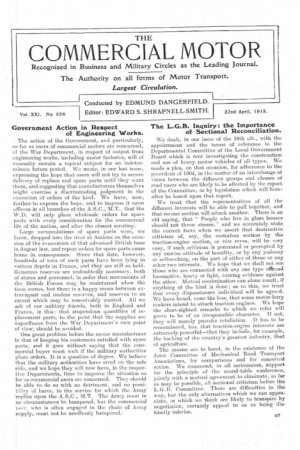Conducted by EDMUND DANGERFIELD.
Page 1

If you've noticed an error in this article please click here to report it so we can fix it.
Vol. Xxl. No. 528. Editor: EDWARD S. SHRAPNELL-SMITH. 22nd April, 1915.
Government Action in Respect
of Engineering Works.
The action of the Government, and particularly, so far as users of commercial motors are concerned, or the War Department, in respect of output from engineering works, including motor factories, will of necessity remain a topical subject for an indeterminate future period. We wrote, in our last issue, expressing the hope that users will not try to secure delivery of replace and spare parts until they want them, and suggesting that manufacturers themselves might exercise a discriminating judgment in the execution of orders of the kind. We have, now, further eto express the hope, and to impress it upon officers in all branches of the A.S.C., M.T., that the W.D. will only place wholesale orders for spare parts with every consideration for the commercial -life of the nation, and after the closest scrutiny.
Large accumulations of spare parts were, we know, dropped into the river at Amiens on the occasion of the evacuation of that advanced British base in August last, and repeatorders for spare parts ca-me home in consequence. Since that date, however, hundreds of tons of such parts have been lying in various depots in France, and they are still so held. Generous reserves are undoubtedly necessary, both of stores and personnel, in order that movements of the British Forces may be maintained when the time comes, but there is a happy mean between extravagant and useless reserves, and reserves to an extent which may he conceivably wanted. All we ask of our military friends, both in England and France, is this: that stupendous quantities of replacement parts, to the point that the supplies are superfluous from the War Department's own point of view, should be avoided.
One great problem before the motor manufacturer is that of keeping his customers satisfied with spare parts, and it goes without saying thatthe commercial buyer must wait if the military authorities place orders. It is a question of degree. We believe that the military authorities have erred on the safe side, and we hope they will now have, in the respective Departments, time to improve the situation so far as commercial users are concerned. They should he able to do so with no detriment, and no possibility of harm, to the service for which the Army replies upon the A.S.C., M.T. _ The Array must in no circumstances be hampered, but the commercial it5,.er, who is often engaged in the chain of Army supply, must not he needlessly hampered.
The L.G.B. Inquiry: the Importance of Sectional Reconciliation.
We dealt, in our issue of the 18th ult., with the appointment and the terms of reference to the Departmental Committeeof the Local Government Board which is now investigating the construction and use of heavy motor vehicles of all types. We made a plea, on that occasion, for adherence to the precedent of 1904, in the matter of an interchange of views between the different groups and classes of road users who are likely to be affected by the report of the Committee, or by legislation which will-hereafter be based upon that report.
We trust that the representatives of all the different interests will be able to pull together, and that no-one section will attack another. There is an old saying, that " People who live in glass houses should not throw stones," and we accurately state the correct facts when we assert that destructive criticism of, say, the motorbus section by the traction-engine section, or vice versa, will be very easy, if such criticism is generated or prompted by any unwise attitude of hostility, or by any jealousy or selbseeking, on the part of either of these or any other two interests. We hope that we shall not see those who areconnected with any one type ofbroad locomotive, heavy or light-, turning evidence against the other. Mutual recrimination can alone result, if anything of the kind is done; as to this, we trust that every dispassionate individual will be agreed. We have heard, none the less, that some motor-lorry ma-hers intend to attack traction engines. We hope the short-sighted remarks to which we refer will prove to be of an irresponsible character. If not, they will merely provoke retaliation. It has to be remembered, too, that traction-engine interests are extremely powerful—that they include, for example, the backing of the country's greatest industry, that of agriculture. The means are tohand, in the existence of the Joint Committee of Mechanical Road Transport Associations, for comparisons and for concerted action. We commend, in all seriousness, support for the principle of the round-table conference, jointly with a. mutual agreement to eliminate, so far as may be possible, all sectional criticism before the L.G.B. Committee. There are difficulties in the way, but the only alternatives which we can appreciate, or which we think are likely to transpire by negotiation, certainly appeal to us as being distinctly inferior.




















